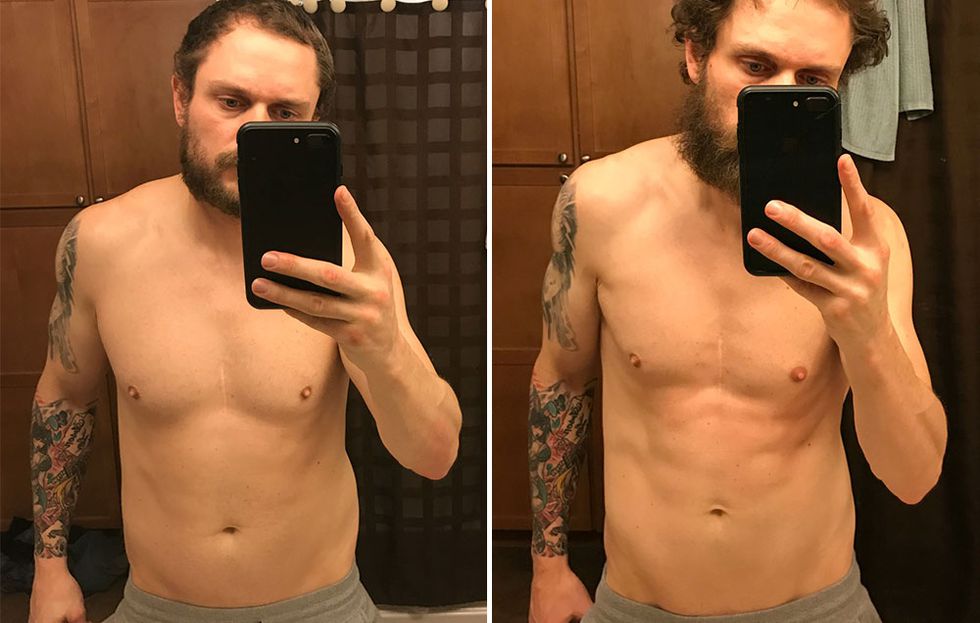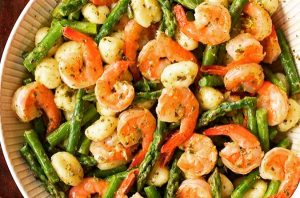
When we first told you about Anthony Howard-Crow, a 32-year-old online trainer and YouTuber in Loveland, Colorado, he had just embarked on a diet that would make the American Dietetic Association shit bricks: 2,000 calories a day of ice cream, 500 calories a day of protein supplements, and a bit of recreational alcohol. Nothing more. Nothing less. For 100 days.
We can now report that Howard-Crow survived the diet. Some might even call it a success, in that he lost 32 pounds, and saw improvements in his blood work. Which you’d think would make him happy, right?
Not even close.
“This diet was, hands down, without a doubt, the most miserable dieting adventure I have ever embarked upon,” he says.
That’s really saying something, considering that he previously underwent stunt diets that included 30 days of nothing but fast food and a shorter experiment with 50 percent ice cream.
He was barely halfway through the project when he began to lose interest in everything. He used to spend 4 to 7 hours a day recording and editing videos for his YouTube channel (he has a degree in film production) and updating his blog. Those dwindled to a few minutes here and there. He even quit going to the gym for the final month of the diet.
Nor did he suffer in silence. “I was moody, and just generally unenjoyable to be around,” he says.
His goal was to show that calories matter more than anything else for weight loss—more than macronutrients (carbs, protein, fat), more than exercise, more than when you eat or how many times you chew your food or whatever else the cool kids are talking about these days. If he could go from 192 to 160 pounds in 14 weeks while eating dessert at every meal, then it’s impossible to argue, as many do, that calories don’t matter.
“The overall goal of my projects is never to present them as healthy, real ways to lose weight,” he says. If that’s what you’re looking for, The Men’s Health MetaShred Diet is a smart, effective choice. The diet provides an eating plan that helps you control calories without even noticing—and definitely without feeling as miserable as Howard-Crow did.
Weight of the evidence
Still, whether he meant to or not, he showed that in some respects the ice cream diet wasn’t entirely unhealthy. For example, his blood lipids all improved, with higher HDL cholesterol, lower LDL, and dramatically lower triglycerides. Even his blood glucose declined slightly, despite eating enough sugar to put Buddy the Elf into a diabetic coma.
Spencer Nadolsky, D.O., a weight-loss and obesity specialist, isn’t surprised that all those blood markers moved in a healthy direction. “With weight loss, a lot of these things improve regardless of the underlying issue,” he says. “But it’s interesting that he got so tired.”
Nadolsky has been there, in a way. While getting down to mid-single-digit body fatfor a bodybuilding contest, Nadolsky found himself increasingly tired. Not only that, he says his testosterone fell from 600 to 200 nanograms per deciliter of blood, a predictable consequence of restricting calories while still training as hard as possible. “I felt it too,” he says. “No libido, no energy.”
I didn’t ask Howard-Crow about his sex drive, although he did mention that his wife wanted the project to end even more than he did.
But the scariest part, Howard-Crow says, was seeing how much muscle he lost. The 32 pounds he lost included a lot of muscle. “I was still not extremely lean,” he says.
The muscle loss was due to three factors: First, and possibly most important, he quit working out when his energy and ambition cratered. Second, he was eating below his maintenance level—which was of course the point of the experiment. Third, he estimates he was eating just 120 grams of protein a day; someone trying to maintain muscle on a weight-loss diet is typically advised to eat 1 gram per pound of target body weight.
Although he didn’t have a specific target weight in mind—again, the point of the project was to lower calories and see what happened—120 grams a day wouldn’t have been nearly enough protein to prevent muscle loss.
Time off for bad behavior
Seeing these results, and hearing how hard it was to achieve them, suggests Howard-Crow is done with stunt dieting. If the “after” picture isn’t much more impressive than the “before,” what’s the point?
“Despite how miserable it was, I definitely don’t want this to be my last stunt diet,” he says, while acknowledging he has no idea what his next one might be. “Hopefully some kind of food-related inspiration will just hit me one day, or come out of seeing things through my clientsthat I never even thought about. Either way, you have not seen the last of these crazy projects.”
Lou Schuler is an award-winning journalist and contributing editor to Men’s Health. His latest book is Strong: Nine Workout Programs for Women to Burn Fat, Boost Metabolism, and Build Strength for Life, with coauthor Alwyn Cosgrove.
By Men’s Health




